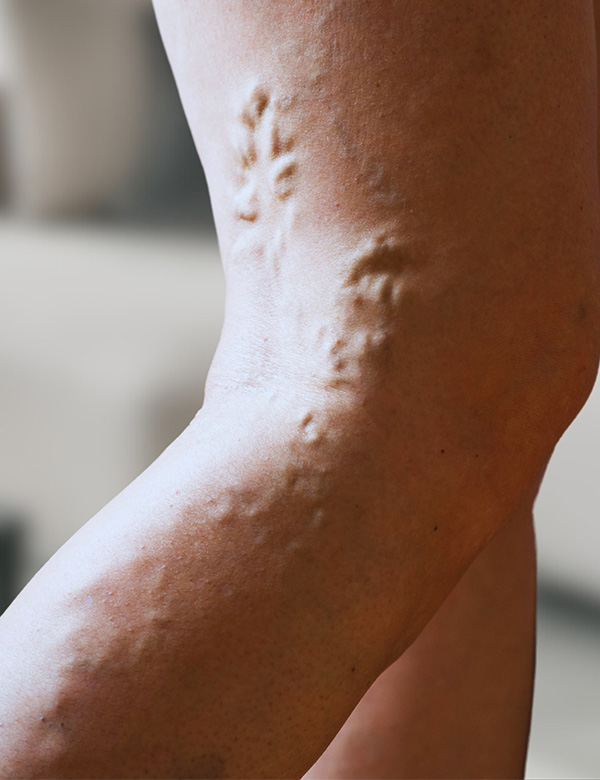Investigating Erectile Dysfunction
Treating Erectile Dysfunction as a Symptom of Vascular Disease - at Derma Medical Clinic in Zurich – Sihlcity
Erectile Dysfunction
Chronische Abszesse und schmerzhafte Knoten durch erfahrenen Hautarzt abklären und behandeln in der Derma Medical Clinic in Zürich - Sihlcity
Circulatory disorders in the blood vessels are the most common physical cause of erectile dysfunction – in up to 90% of cases. They can also be an early warning sign for a heart attack or stroke. Our vascular specialist will examine your vascular condition and discuss suitable treatment options with you.
Examinations
Ultrasound
Procedure
Initial Consultation
Ultrasound
Duration
approx. 45 minutes
Erectile Dysfunction at a Glance
When is it advisable to investigate an erectile problem?
For an erection, the blood vessels in the penis must open wide to allow sufficient blood flow.
If this doesn’t happen, it’s often due to a narrowing caused by calcification of the blood vessels. Studies show that in up to 90% of cases with physical causes, a vascular problem is responsible.
The blood vessels in the penis are significantly smaller and narrower than the large arteries in the heart or brain.
If deposits (
arteriosclerosis
) form, the consequences are therefore felt earlier in the penis, because even small narrowings here disrupt blood flow.
In the heart or brain, the same deposits can develop at the same time, but only become noticeable later when the vessels are already more severely damaged.
Erectile problems are therefore often the first warning sign of a systemic vascular disease and should definitely be investigated by a vascular specialist.
Sometimes there is also venous insufficiency. In this case, blood cannot be retained in the penis and flows out too quickly. Affected individuals then report lack of firmness or a rapid loss of erection.
An examination is recommended if you…
- notice that an erection does not occur or does not last
- already have risk factors: diabetes, high blood pressure, elevated blood lipids, smoking or obesity, testosterone deficiency, varicose veins
- have a family history of heart attack, stroke, or vascular diseases
- the symptoms appear suddenly or progressively worsen
- develop erectile problems after a prostatectomy, vasectomy, inguinal hernia operation, or injury/accidents in the pelvic area
- to rule out a physical cause
wish to specifically use your potency problems as an opportunity to also check your cardiovascular health

When is it advisable to investigate an erectile problem?
For an erection, the blood vessels in the penis must open wide to allow sufficient blood flow.
If this doesn’t happen, it’s often due to a narrowing caused by calcification of the blood vessels. Studies show that in up to 90% of cases with physical causes, a vascular problem is responsible.
The blood vessels in the penis are significantly smaller and narrower than the large arteries in the heart or brain.
If deposits (
arteriosclerosis
) form, the consequences are therefore felt earlier in the penis, because even small narrowings here disrupt blood flow.
In the heart or brain, the same deposits can develop at the same time, but only become noticeable later when the vessels are already more severely damaged.
Erectile problems are therefore often the first warning sign of a systemic vascular disease and should definitely be investigated by a vascular specialist.
Sometimes there is also venous insufficiency. In this case, blood cannot be retained in the penis and flows out too quickly. Affected individuals then report lack of firmness or a rapid loss of erection.
An examination is recommended if you…
An examination is recommended if you…
- notice that an erection does not occur or does not last
- already have risk factors: diabetes, high blood pressure, elevated blood lipids, smoking or obesity, testosterone deficiency, varicose veins
- have a family history of heart attack, stroke, or vascular diseases
- the symptoms appear suddenly or progressively worsen
- develop erectile problems after a prostatectomy, vasectomy, inguinal hernia operation, or injury/accidents in the pelvic area
- to rule out a physical cause
wish to specifically use your potency problems as an opportunity to also check your cardiovascular health
Treatment
It begins with a discussion about your symptoms, risk factors, and pre-existing conditions. We inquire about the course of the condition, medications, and situations in which the problems occur.
This is followed by a thorough diagnostic assessment and the exclusion of vascular involvement: After a blood draw (fasting, in the morning), if not already performed, a vascular screening follows: Blood circulation is measured completely pain-free in a few minutes using cuffs and small sensors on the arms, legs, and toes.
Subsequently, our vascular specialist examines the blood flow in the penile and pelvic arteries using ultrasound. For this, a vasodilator medication is administered to reliably assess blood flow and erectile function.
What Happens after the Examination?
We explain whether the cause of your symptoms is vascular-related or otherwise. If a circulatory disorder or testosterone deficiency is present, we also discuss its extent and clarify whether the heart or cerebral vessels could also be at risk.
How is the investigation of potency problems carried out?
Initial Consultation
We discuss your symptoms, risk factors, pre-existing conditions, and medications, and clarify when and in what situations the problems occur.
Examination
First, we perform a blood draw (in the morning, fasting). This is followed by a vascular screening. Subsequently, our vascular specialist examines the blood flow in the penile and pelvic arteries using ultrasound.
Evaluation & Therapy
We explain whether the cause is vascular-related or if other causes exist, and outline treatment options: from medicinal therapy to lifestyle measures or further investigation.

At Derma Medical Clinic, the investigation and treatment of vascular diseases are carried out by
Dr. Andreas Gutwein
, a specialist in Angiology and General Internal Medicine, FA Phlebology
He is a specialist in vascular diseases, has many years of experience in the diagnosis and treatment of erectile dysfunction, and is, among other things, head of the Men’s Clinic at Cantonal Hospital Aarau.

Dr. med. Andreas Gutwein
Specialist in Angiology and General Internal Medicine FMH
Expert in Vascular Medicine & Men’s Health

Dr. med. Benjamin Miller
Board-certified Specialist in Dermatology & Venereology FMH
What you can expect from us
Angiology: Vascular medicine
Erectile problems are often more than a taboo subject: they can be the first sign of vascular disease. Through our specialist in Angiology, you receive not only an answer to your symptoms but also an assessment of your general vascular health.
Vascular ultrasound: precise diagnostics
We combine clinical examination with ultrasound and – if necessary – further imaging. This allows us to determine if vascular narrowing is present and if other vessels could be affected.
Vascular medicine meets dermatology
Many vascular diseases first become noticeable on the skin – through swelling, discoloration, or visible veins. In the Derma Medical Clinic, vascular medicine and dermatology therefore complement each other perfectly.
Everything under one roof
You receive diagnosis, medical treatment, and cosmetic support in one place. This means you have fixed contact persons, short distances, and coordinated care, from the initial examination to aftercare.
Does your erection not last or not occur at all?
Recognize your symptoms as a sign and have them investigated to determine if vascular disease is behind them.
FAQ – Frequently Asked Questions about Erectile Problems
What is vascular-related erectile dysfunction?
Erectile dysfunction, medically known as erectile dysfunction, occurs when a sufficient or sustained erection is not possible. Common causes include circulatory disorders or a so-called venous leak of the penile vessels. If a physical cause is present, a vascular problem is the trigger in up to 90% of cases.
Why can erectile problems be a warning sign for heart attack or stroke?
Vascular narrowings often become noticeable first in the fine arteries of the penis. Erectile dysfunction can therefore be an early warning sign of arteriosclerosis (hardening of the arteries).
Heart attacks or strokes often occur years later. Studies show: Men with vascular-related erectile dysfunction have a significantly increased risk (up to 50%!) of cardiovascular diseases (heart attack, stroke, etc.). It is not without reason that the penis is referred to as the “antenna of the heart”.
Which doctor is responsible for erectile dysfunction – Urologist or Angiologist (Vascular Specialist)?
A urologist primarily investigates organic causes. If a vascular problem is suspected, an angiologist/vascular specialist with this focus is the right contact person.
How is a vascular medical investigation carried out?
After a discussion about symptoms and risk factors, a vascular screening and an ultrasound examination (e.g., duplex sonography) of the penile or pelvic arteries follow.
Why is an additional screening performed at the Derma Medical Clinic before each vascular ultrasound?
We use the AngE™ ABI+ Screening because it measures blood flow in the arms, legs, and toes precisely and painlessly within a few minutes. Vascular problems such as calcifications or circulatory disorders often show up there first, even before symptoms arise. This gives you a particularly reliable examination – a diagnostic standard that is otherwise only offered in specialized vascular centers.
Which blood values are examined for erectile problems?
In addition to cholesterol and blood sugar, hormones (testosterone, thyroid) can also be checked. This allows for the identification of risk factors and possible co-existing conditions.
Can medications worsen erectile dysfunction?
Yes, e.g., some blood pressure medications or psychotropic drugs can affect erectile function. Your doctor will check if a change is advisable.
What role does diabetes play in erectile problems?
Diabetes damages blood vessels and nerves. Therefore, men with diabetes are significantly more likely to experience erectile problems. Early investigation is particularly important.
Can erectile problems be improved through lifestyle?
Yes, regular exercise, smoking cessation, a healthy diet, and weight management can promote vascular health and alleviate symptoms.
Are medications like Viagra effective for vascular damage?
These medications can help, but are only effective if sufficient blood flow is still present. In cases of severe vascular damage, the underlying causes must first be treated.
When should you definitely see a doctor for erectile problems?
If symptoms persist for longer than three months or worsen, a medical investigation should be carried out, not least to detect vascular diseases in time.



